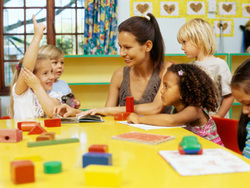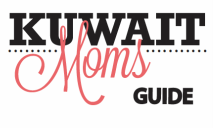
One of the first major decisions moms and dads face is deciding when to send a child to preschool. For some this can be an agonizing decision. How old should the child be? Will they suffer from separation anxiety? How to know if the preschool or nursery is the right one?
Kuwait Moms Guide spoke with Alison Verdonk, founder of Happy Chappies and a London-trained Montessori teacher to get some answers. An expert in the field, Verdonk offers some advice for parents considering preschools n Kuwait.
KMG: How will I know if my child is ready for preschool?
Alison: The best way to decide is to spend time thinking about your child and to talk to other people who know your child well. Is your child fairly independent, have they spent any time away from you? If your little one loves to be with other kids then this is a good indicator that they are ready to start. If you want to attend local mother and toddler groups this is a great way to observe if your little one is ready. Once you enroll, a good preschool will let you know if your child is not ready.
KMG: What are some things I should consider when choosing a preschool?
Alison: This is a very important decision. All preschools and nurseries should have crayons, counting blocks, letters and various arts and crafts, but how, where and when they're introduced can have long-reaching ramifications.
Children in high-quality preschools display better language, cognitive, and social skills than children who attended low quality programs. They have longer attention spans, stronger social abilities, and better language and math skills well into their elementary school careers. While most schools will offer some amount of circle time and finger-paint, they are not all the same.
More brain development occurs in the first five years of life than at any point thereafter. Some preschools are completely "play based," while others have children as young as three or four tracing numbers and letters to prepare them for kindergarten. It all comes down to learning style.
Each preschool will have a particular daily structure and typical activities, so be sure to ask what a typical day would look like. Make sure the preschools you are considering employ teachers that have earned early childhood education degrees, and that the preschool is fully licensed.
1. Look at the art. A picture is worth a thousand words, so look at what's hanging on the walls. Does everything look the same? Do all the pictures have crayon within the lines? You want to see your child’s work, not the staff’s.
2. Look at the quality of educational materials available to the children in the classroom. Are there lots of hands-on activities for your child to touch, experiment, play with? Are they in good order, clean and no pieces missing?
3. If there are mostly posters on the wall and tables and chairs with no equipment available this is not a good sign. Young children need plenty of hands on equipment to work with and learn.
4. Does the nursery offer TV/iPads everyday as part of the child’s education? This is not ideal in the preschool environment as it does not allow social interaction or learning through hands on. Children need to freely explore, manipulate, and test everything in the environment themselves, not observe it on a screen. There is plenty of time for that later on in their life.
5. Another point to consider is visiting; does the school have an open door policy? Can parents visit at any time, or are there set days for observation? If you are not allowed into the classroom at any time, this is generally not a good sign.
6. Ask to see the whole nursery, not just the class your child will attend. It is important to know how your child will develop as they grow, and it lets you observe the nursery in action as a whole.
7. Ask about safety. How does the school ensure student safety? How do they keep track of pickups at the end of the day? Is there a security guard? Does the staff have first aid? What is their policy in the event of an emergency?
8. Check for a first aid box and make sure you see visible detectors for smoke/fire alarms.
9. Talk to the principal and the teachers. See what the preschool's goals are for children that age.
10. Look at the classroom and facilities, and briefly observe how comfortable the children seem to be. Are they settled and engaged in activities. Do the children in the classroom approach the adults? Do the teachers seem to huddle and chat to each other or play with the children?
11. Try to overhear the teacher’s tone of voice when you're in the hall outside the classroom, do they speak to the children or bark orders? You want a center that has a loving nurturing environment, one that stimulates a child’s curiosity. If you find that, the child will come to love and have a positive attitude about preschool.
Another thing to consider is word of mouth. This is always the best method to narrow down your search. We suggest asking family, friends, even the local mums and tots you attend.
Finally, if you get a bad feeling about a place, don't bring your child there. You are probably right. Always trust your gut. If something seems off about a place, trust this instinct.
KMG: What questions should I ask the teachers?
Alison: There are many questions you can ask, and don’t be afraid to ask them! A good teacher will be happy to answer all your fears or concerns as well as your day to day questions regarding your child.
If the teacher is busy teaching then her main priority will be to focus on the wellbeing of her students so please keep this in mind. A good school will set up a time for you to meet with the teacher if she is unable to answer all your questions during your tour. The principal will also be able to answer your questions because there should be a standard that is met and maintained by all teachers.
1. Ask about the day's schedule and what curriculum they use, if any.
2. Is there a posted lesson plan? Do parents get a written report at the end of the term?
3. Are there parent-teacher conferences? Is there a newsletter, emails or other forms of communication to know what is going on with your child or events in the nursery?
4. Does the preschool have any special occasion days in school (like Grandparents day, Color days, international days, Halloween party or field trips? Does the preschool organize guest speakers (such as dentist, zookeeper and authors)?
5. What extracurricular activities or clubs offered? Some special things to look for would be music, art, foreign languages, physical education (such as karate or ballet).
6. How often do the children get to play outdoors, and/or indoors.
7. How do they celebrate a child’s birthday? Does the teacher have any children of her own?
8. If your child isn’t toileting independently, you’ll need to ask if potty training is a requirement. Some preschools require a child to be fully potty trained, whilst others are willing to assist with the process of training.
9. Ask her if classroom rules are clear so that your child knows what to expect. Ask how she encourages positive behavior on a daily basis.
10. Parents should look for a positive philosophy that helps children understand what they can do, as opposed to what they can’t do. A major part of young development is testing boundaries. Ask how the school deals with behavior such as hitting or biting. Ask how they deal with conflict – do they believe children should work things out themselves? Do they believe in "time outs"? It's important that you agree with a school's disciplinary approach and trust their judgment – small children have a hard time with mixed messages.
11. What is the teacher-to-child ratio? An average class of 3- 4 year olds should have no more than 10 children per adult, according to the National Association for the Education of Young Children (NAEYC).
12. Ask your child’s teacher if there are opportunities for parents to be involved. If this is something that you would like to do, then it is important to find out if parents are encouraged or not.
There is no limit on the number of questions you can ask. A good preschool teacher will be more than happy to answer all your questions at a time convenient for you both.
KMG: What challenges are specific to Kuwait that I should consider?
Alison: When considering a nursery in Kuwait you first need to decide if you want your child to attend an English, American, French, Arabic or bi-lingual nursery. Location is also very important as roads can be blocked bumper to bumper in the day during school drop off and people rushing to work. We can have boiling summer temperatures and freezing winter temperatures, as well as sandstorms. Documentation and paperwork can take time so be prepared to wait a couple of months for your Civil ID to be issued.
KMG: How will my child benefit from being in preschool?
Alison: The chance to interact with other children is one of the big benefits of preschool.
Interacting with other children means learning how to wait, how to take turns, and how to listen. Young children learn social skills when they interact with other children. These social skills are critical to a developing personality. By learning to communicate with different people and to adjust to different environments, it increases your child’s communication skills, knowledge, adaptability and self-confidence.
There are other advantages to preschools -- primarily that they are the foundations for academic learning. In preschool your child will be exposed to letters, listen to stories and songs, all of which are the building blocks needed to grasp phonics and reading skills when it is developmentally appropriate. The play that takes place with numbers, shapes, water, sand, and containers form the foundation for understanding some basic math concepts. Matching, sequencing, one-to-one correspondence are all activities that are done over and over in preschool settings and help children get ready to learn academics. Watching other children pursue a challenging task is also helpful. The presence of other children and a wide variety of materials are two big reasons why a preschool is a good thing.
Preschool provides a place where your child can gain a sense of self, explore, play with peers, and build confidence. Children in preschool discover that they are capable and can do things for themselves, from small tasks like pouring their own juice and helping set snack tables, to tackling bigger issues like making decisions and how to work and finish an activity or project.
Young children begin asking some wonderful questions about the world around them, what happens to the water after the rain? Do trees talk? Why are apples green?
Quality preschools help children to find answers through exploration, experimentation, and conversation.
Above all your children will hopefully learn to love learning, and this is a wonderful gift to impart to your child for their future.
Alison Verdonk, founder of Happy Chappies, is a London-trained Montessori teacher and B.T.E.C. Nursery nurse with over 15 years' teaching experience. She has lived in Kuwait for 18 years and is happily married with three children.
Editor's Note: Originally published in the Dec 17, 2013 Kuwait Moms Guide Newsletter - Issue #2

 RSS Feed
RSS Feed
